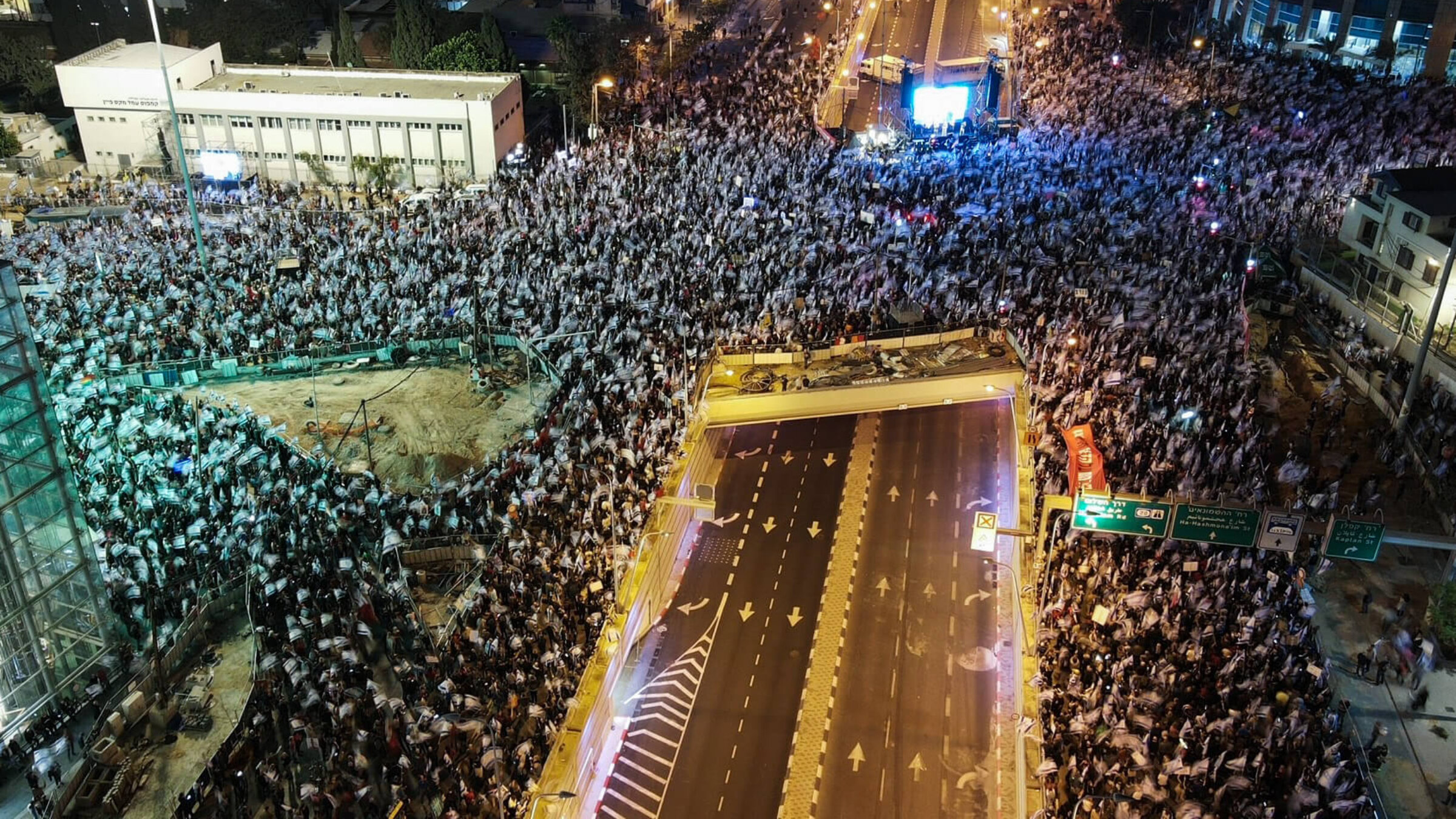I made aliyah 50 years ago. The recent protests remind me of why I stay
The current crisis has clarified my reasons for and reinforced my commitment to living here

An aerial picture shows a protest against the Israeli government’s controversial judicial reform bill in Tel Aviv on March 11, 2023. Photo by Jack Guez/AFP via Getty Images
I had never asked myself: Why did I move to Israel and why do I stay?
I did not ask in 1973, when I first came and served in the army during the Yom Kippur War. I did not ask in 1982, when my Israeli-born husband went to fight in Lebanon in a war he didn’t believe in, out of loyalty to his country and the soldiers he commanded. I did not ask even in 1995, when Prime Minister Yitzhak Rabin was assassinated by an extremist Jew, and the peace process I so deeply believed in began to unravel.
In the past three months, as this government drove Israel into a frenzy of over 141 proposed legislative bills that would effectively dismantle the Supreme Court, limit civil rights, enshrine religious extremism, and irrevocably change our society, I could no longer avoid the question.
Why am I here?
Did I leave my family in in the United States when I was only 19 to live in a country that is becoming a pariah in the Western world? Did I choose to raise my children here so they would live in a proto-fascist society? How can I live in a country that continues to occupy another people? Can I continue living here when male religious extremists, in a rage of political power, try to destroy my life as a liberal Jew, and as a woman?
It is actually these crises that have clarified my reasons for and reinforced my commitment to being here. I came to Israel because I believe that the establishment of Israel is the most important experience in modern Jewish history, and I want to be a part of it. I am here to help Israel become Jewish and democratic, even if I still don’t know if those two ethics can ever coexist. I came here to be part of the struggle that began in the Enlightenment for the character and soul of the Jewish people, the tensions between particularism and universality, and questions of Jewish modernity and sovereignty.
The answers to these questions came specifically because of this current crisis of democracy. Within the protest movement, together with thousands of like-minded Israelis from the left and the right, religious and secular and even some ultra-Orthodox, I have the opportunity, and the obligation, to at least try to affect Israel’s future.
Hundreds of thousands of Israelis have been demonstrating against the judicial coup for 12 consecutive weeks. Women dress in red robes and white hats, in cautionary street performances of The Handmaid’s Tale. A group of Navy SEAL veterans took to kayaks draped in Israeli flags and rowed towards Netanyahu’s private seaside villa in Caesarea, as others snorkeled alongside them. Before a scheduled performance at the Israeli opera, Israel’s Declaration of Independence was projected onto a huge screen, and the audience stood on its feet, sang the national anthem, and rhythmically called out, “De-mo-cra-cy,” the rallying call of the protests.
The largely grassroots organizations behind the protests have shown an impressive ability to pull together ideologues and gain public trust. Hundreds of volunteers organized buses and prepared banners and flyers. Lawyers have published their mobile phone numbers and volunteered their services in case any of the demonstrators are arrested. Academics offer free lectures to groups that want to understand better the threats to democracy.
Demonstrators come with snare drums, saxophones, flutes and vuvuzelas, providing a cacophonic playlist. Yet despite the noise and the crowds, all of the demonstrations have been peaceful, even rave-like. For three months, as the demonstrations grew each week in numbers and intensity, the mood has become increasing determined, even hopeful. In those moments as part of the crowd, I share a sense of deliberate purpose, a common recognition that the situation is urgent, and that it’s up to us — to all of us — to ensure our and our country’s future.
All this became even clearer earlier this week. Just before 9 p.m. on Sunday evening, when Prime Minister Benjamin Netanyahu fired Defense Minister Yoav Gallant because he dared to publicly call for a halt to the judicial overhaul, our cellphones began to buzz. Individuals from my book club, my farm-to-table group, my knitting group, alumni groups, all sent the same WhatsApp message: Get out of bed, stop watching Netflix, put your coat on, and get out and protest.
By 10 p.m., tens of thousands of Israelis were on the streets. It was a spontaneous, unprecedented response to Netanyahu’s brazenly dictatorial, irresponsible, and vindictive behavior and the sense that he, and the country, had spun out of control. People poured out of their houses, the crowds growing as they approached the prime minister’s residence in central Jerusalem and other sites throughout the country. People smiled at each other, heady from their own spontaneity, inspired by their own resolve, buoyed by their sense of history.
By midnight, the crowds numbered hundreds of thousands. The next morning, almost all of Israel’s business and professional communities had joined, and the country shut down. By Monday night, Netanyahu waved a white flag and promised to pause the judicial blitz at least until after the Knesset’s Passover recess.
We won the first round, but the struggle for Israel’s democracy and place in history is far from over. To placate ultra-nationalist Minister of National Security Itamar Ben-Gvir, a disciple of Meir Kahane, Netanyahu agreed to provide Ben-Gvir with his own armed militia. And despite the ostensible hiatus, the coalition is continuing to prepare its legislative proposals to neuter the Israeli Supreme Court.
I’ve been protesting for peace and social justice for many years. When we were younger, my friends and colleagues and I led some of those demonstrations for women’s rights, for social justice, and against the occupation. Over the years, it seemed like our age group was still in the streets while younger generations showed little interest or concern. But this time, it was clear that most of the demonstrators were young. All of them seemed to know the newest chant sung everywhere: “You picked on the wrong generation.”
My sense of history has redoubled. Not only am I part of it, I am also part of its transition to the next generation, an active l’dor v’dor.
Award-winning Israeli novelist, literary critic and pianist Assaf Inbari describes the pioneers who founded Kibbutz Afikim in his novel Home not as a generation with exceptional talents, qualities or energies. Many of them were petty and mean-spirited and silly — just like we are. But they were a generation of people with exceptional commitment and a sense of responsibility for history.
History isn’t linear, and we can be active players in its arc. That’s why I came here, and that’s why I’m staying.
To contact the author, email [email protected]















